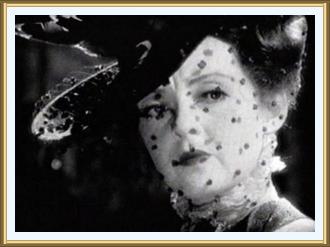


The story involves Regina and brothers Ben (Charles Dingle), and Oscar (Carl Benton Reid), who each plan to contribute $75,000 to build a cotton mill. For Regina to be able to do this, she must make peace with her long-estranged husband Horace (Herbert Marshall), who is suffering from a heart condition. Regina, always trying to improve her financial and social position, advises her brothers that Horace will require a higher share of the profits since his money is so badly needed. Her brother Oscar counters with the proposal that she entertain the possibility of a marriage between her daughter Alexandra (Teresa Wright) and his slimy son Leo (Dan Duryea) so as to keep all that wonderful money in the family. The fact that they are first cousins is apparently of little concern. The business proposal is made to Horace who can see the greed that drives them, and he refuses to give Regina the money. An alternate plan evolves whereupon Leo is pressured by his father steal bonds from Horace's bank, where he is employed. Horace inadvertently discovers that the bonds are missing and advises Regina, who gleefully plans to use this information as a means of blackmailing her brothers for a substantially higher share in the new mill. In retaliation, Horace claims that he gave Leo the bonds as a loan, thereby cutting Regina out of the deal completely. When Horace suffers a heart attack, Regina makes no effort to give him his medicine, and he dies without revealing his willingness to loan the money to Leo. Regina is then able to strongarm her brothers into giving her controlling interest the mill. The price for her overt greediness is the loss of her daughter's love and respect, as she is for the first time opening her eyes and seeing her mother's side of the family for who they really are. The results of this screen version of Hellman's story is actually a well crafted ensemble piece, due mostly to the strong performances by the veterans of the stage production. I'm sure Davis felt they were there to support her, but they more than hold there own. Collinge (Aunt Birdie), in fact, almost steals the movie. Wyler should be credited for the ensemble feel, as he was successful for the most part, in keeping the reigns tight on Davis' natural tendency to overdo. Kudos to cinematographer Toland, who's deep-focus technique made famous in Citizen Kane, works extremely well during the memorable murder scene (featuring Davis's Kabuki look). 
In this lavish 1941 Samuel Goldwyn treatment of Lillian Hellman's 1939 play about greed in the turn-of-the-century south, Bette Davis takes over for the role of the conniving Regina Hubbard Giddens, which was so vividly realized by Tallulah Bankhead on Broadway. This is the third and last collaboration between Davis and William Wyler, following the triumphs of Jezebel and The Letter. The pressures of playing a role so identified with Bankhead, and Davis' seeming inability accept anyone's artistic input, made for some furious battles between the Star and her Director, which have now become Hollywood legend.



During filming, William Wyler was often heard to say, "We'll have to get Bankhead." Such was the tone of their working relationship during this project. It seems they just couldn't agree on anything. He threatened to tie her arms down if she didn't stop twitching and gyrating, in her insistence in doing "Bette Davis" rather than Regina Giddens. Her meddling in the makeup resulted in her ghost-like rice powder appearance, that Wyler felt was contrary to the subtle sexuality of the character which allowed her to so aptly manipulate the men around her to submit to her will. This was apparently the quality that Bankhead brought to the part that Davis was either unwilling or unable to explore.


- Bette Davis - Regina Hubbard Giddens
- Herbert Marshall - Horace Giddens
- Teresa Wright - Alexandra Giddens
- Richard Carlson - David Hewitt
- Patricia Collinge - Birdie Hubbard
- Dan Duryea - Leo Hubbard
- Charles Dingle - Ben Hubbard
- Carl Benton Reid - Oscar Hubbard
- Jessie Grayson - Addie



- William Wyler - Director
- Samuel Goldwyn - Producer
- Alan Campbell - Screenwriter
- Lillian Hellman - Screenwriter
- Arthur Kober - Screenwriter
- Dorothy Parker - Screenwriter
- Gregg Toland - Cinematographer
- Meredith Wilson - Composer (Music Score)
- Dan Mandell - Editor
- Stephen Goosson - Production Designer
- Howard Bristol - Set Decoration/Design
- Orry-Kelly - Costumes/Costume Designer
- Perc Westmore - Makeup
- William Tummel - Asst. Director


- Best Actress (nom) - Bette Davis - Academy
- Best Art Direction (nom) - Howard Bristol - Academy
- Best Art Direction (nom) - Stephen Goosson - Academy
- Best Director (nom) - William Wyler - Academy
- Best Editing (nom) - Dan Mandell - Academy
- Best Original Screenplay (nom) - Lillian Hellman - Academy
- Best Picture (nom) - Academy
- Best Score (nom) - Meredith Willson - Academy
- Best Supporting Actress (nom) - Patricia Collinge - Academy
- Best Supporting Actress (nom) - Teresa Wright - Academy
- 10 Best Films (win) - Film Daily
- 10 Best Films (win) - National Board of Review of Motion Pictures
- Best Film - William Wyler - New-York Film Critics Circle Award









